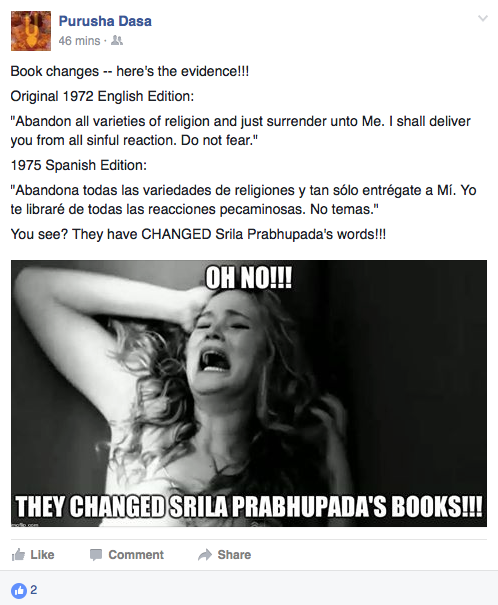By Ajit Krishna Dasa
I was mildly disturbed to read Yadavendra Dasa’s “Treacherous Intervention” posted March 19th in the Sampradaya Sun.
Yadavendra Prabhu notes that in the two editions of Bhagavad-gita As It Is (1972 and 1983) the text of verse 4.23 differs from Srila Prabhupada’s typewritten text in the original manuscript.
He notes that the original manuscript uses the words “a person” whereas both of the two published editions uses “a man”. He concludes that this is highly sexist, and he argues that the editors must have been on the bodily platform, influenced by male pride and have misinterpreted Srila Prabhupada’s words.
Is Yadavendra Prabhu correct?
The answer is “No!”, and here is why:
Yadavendra Prabhu’s conclusion can be immediately falsified if we can find an instance where Srila Prabhupada uses the word “man” (in his translations, lectures and purports) in the same sense that it is used in the two published editions of Bhagavad-gita As It Is 4.23.
A search on the Vedabase, and in the original manuscripts reveals that there are indeed instances where Srila Prabhupada uses the word “man” in precisely that same way. We find it in for example Bg. 2.70, 4.39 and 6.7.
Original Manuscript 5.7 (“not the man who”):

Original Manuscript 4.39 (“A faithful man”):

Original Manuscript 6.7 (“To such a man”):

Srila Prabhupada gave lectures on all three of the above-mentioned verses, and he did not complain about their wordings.
The word “man” is used in all of these three verses in both the 1968 and the 1972 edition, and we know Srila Prabhupada said they could keep the verses of the 1968 edition in the 1972 edition. He must have been satisfied with them.
In Srila Prabhupada’s purports the word “man” or “men” is used in a similar sense (as in the two published editions) hundreds of times. It is very easy to find them by doing a search on the Vedabase.
This disproves Yadavendra Prabhu’s idea that it is sexist to use the word “man” like it is used in the two published editions – unless he wants to argue that Srila Prabhupada was sexist. But his point is precisely that Srila Prabhupada was not sexist, but that the two editors were.
I guess my point is that if we want to criticise Srila Prabhupada’s editors we must first do our own research properly.














You must be logged in to post a comment.